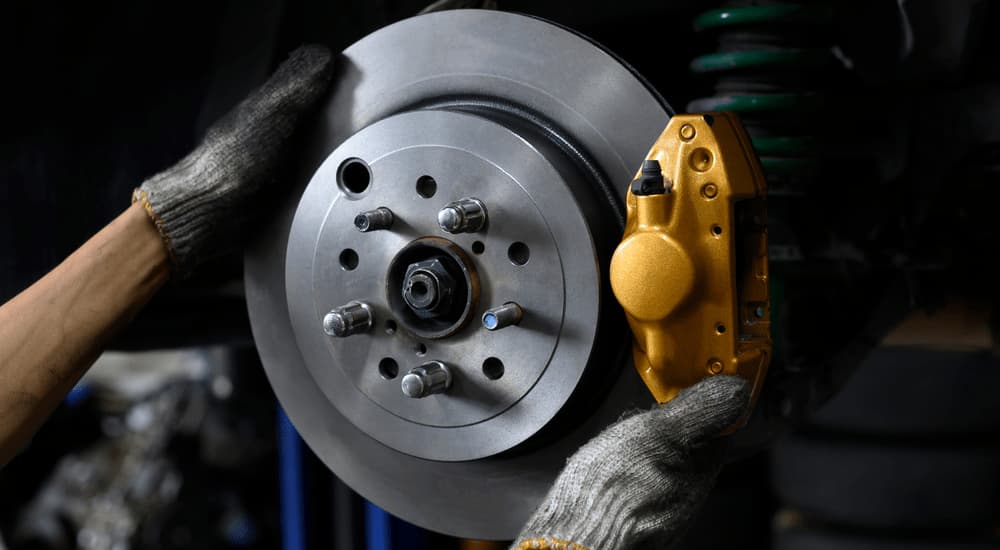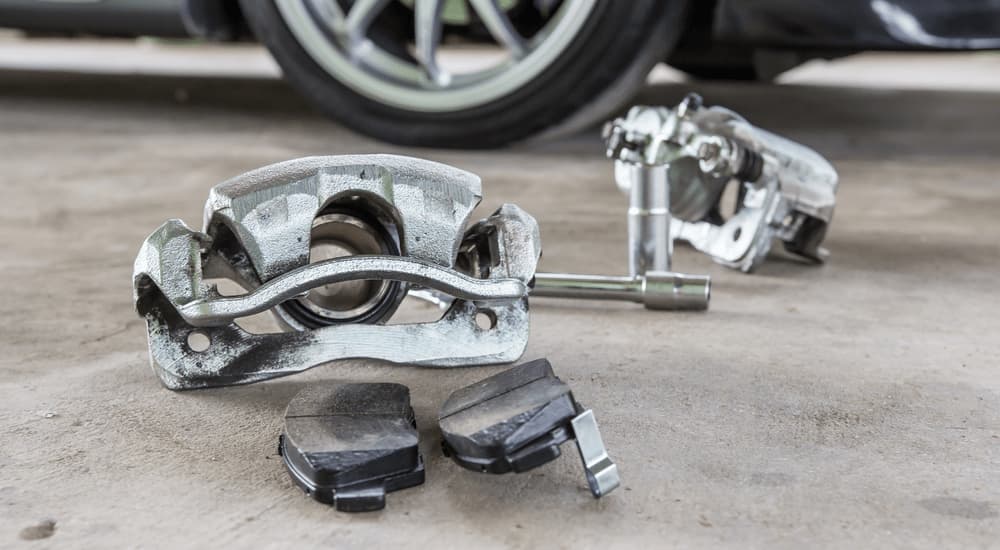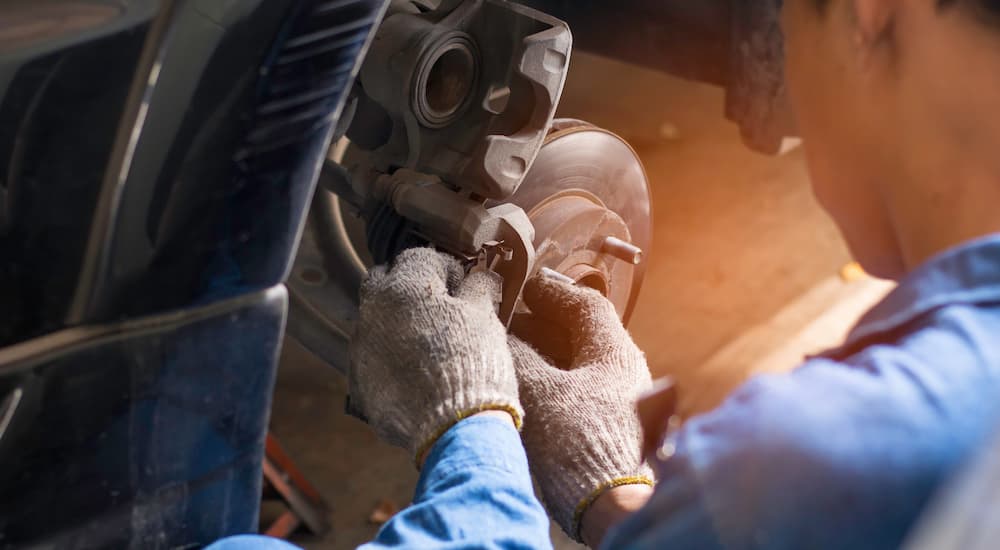Check Out Our Youtube Channel! Click Here

You’re scuttling about town, minding your own business, when you need to apply the brakes quickly, but when you do so, you hear a loud screech coming from the brakes. It is about as unsettling as the creepy music played in horror films, and grinding brakes are nothing short of a nightmare. Are your brakes going bad? Will they fail? If so, how long do you have until that happens? What can you do to prevent that?
If you came to this blog article because you’re wondering why your car’s brakes are grinding, you are not alone. You’re searching for “brake repair near me” for a reason, after all! Many people experience grinding brakes, even on relatively new vehicles. There are some potential risks to this issue, so strap in, get familiar with this common issue, and learn what you can do to prevent the problem from getting worse.
Culprits and Causes: Why Brakes Grind
You might think nothing of it when you hear your brakes grinding, but you should. Grinding brakes are frequently a strong indicator that your vehicle’s brake system is experiencing some kind of underlying issue. The specific cause can vary depending on your car’s make and model; there are some common culprits that could be causing the nerve-wracking noise. Let’s go over some of the potential causes of brake grinding.
Worn Brake Pads
Worn-down brake pads are probably the most common reason why brakes grind. Brake pads press against the brake rotors to slow the vehicle down by generating friction. Unfortunately, brake pads experience a lot of wear and tear over time and, when worn completely down, can cause grinding noises. This results from the pad’s metal backing plate directly encountering the rotor.
Rusty or Corroded Rotors
Brake rotors (sometimes referred to as brake discs) are prone to developing corrosion or rust as they age. This is especially true if your automobile is exposed to harsh conditions or a lot of moisture. Uneven surfaces on the rotors can cause grinding sounds to occur as the brake pads come into contact with those coarse surfaces.
Stones or Debris
Road debris, including small stones or pebbles, can get lodged between the brake rotor and caliper, leading to a grinding noise when you push down on the brakes. Removing the debris and ensuring sufficient clearance can help resolve this common problem.

Brake Caliper Issues
Your car’s brake caliper is where the brake pad is housed, and its job is to help control motion. Should the caliper fail to properly release or get stuck, constant contact between the rotor and pad can result in grinding sounds.
Worn Brake Hardware
When the hardware that keeps your brake pads in place gives out over time, it will cause the brake pads to vibrate and move around in an unusual manner. This results in grinding sounds.
Lack of Lubrication
Lubrication is important for keeping certain braking components operating smoothly. The slide mechanisms and caliper pins require sufficient lubrication. If they are not lubricated well enough, a build-up of friction can cause grinding sounds to occur.
Don’t Ignore Those Grinding Brakes: Here Are the Risks
Grinding brakes are more than just an obnoxious sound; it is a serious safety issue. If you ignore this problem, you could experience more complex problems down the road. Here is a run-down of the different complications that can result.
Reduced Braking Performance
When your brake pads are worn down to the metal backing, their ability to generate friction is seriously reduced. This results in grinding and can reduce braking performance, contributing to longer and, therefore, less safe stopping distances.
Damage to Rotors
Worn brake pads and rotors rubbing together with metal-on-metal contact causing friction leads to potential damage to the surface of the rotor. If issues progress, you might have to spend a lot of money on replacing or resurfacing the rotors; replacing your brake pads is much cheaper.
Complete Brake Failure
You could experience brake failure, although this is considerably rare. Ignoring the grinding sound allows the braking system to keep breaking down, and this puts the safety of yourself and others at risk.
Addressing Grinding Brakes: Get Maintenance Done Soon
When your brakes start to grind, you must act as soon as possible to prevent serious problems from developing. There are several things you can do to crack down on those grinding brakes.
Inspection
If you are willing and able to do so, go ahead and look at the brake pads and rotors to see if there are any signs of wear. Of course, you can always have a certified mechanic do the inspection for you if you are not comfortable with brake pads and rotors.
Brake Pad Replacement
You need to replace the worn-down brake pads, and doing it sooner rather than later is important. These days, many new vehicles come with indicators that alert when your brake pads need replacement. But you could hear grinding without the indicator going off; if that’s the case, replace them soon.

Rotor Resurfacing or Replacement
Resurfacing or a full-on replacement might be in order if the grinding exceedingly damages the rotors. In resurfacing, a slim layer is removed from the surface of the rotor to make the braking surface even again. If the surface is too damaged for resurfacing, you will have to replace the rotor instead.
Caliper and Hardware Inspection
Let your mechanic know that you want a full inspection of your brakes to be done so you know they are functional. Opt to get worn-down or damaged parts replaced to circumvent any additional grinding.
Lubrication
Having enough lubrication on all braking elements is pivotal in preventing problems caused by friction. Get your brakes checked on a regular basis to ensure a longer lifespan.
Avoid Grinding Issues in the Future
No matter how gingerly you drive and how thorough you are in serving your vehicle, brakes wear down over time. There are no two ways about it; however, there are some things you can do to lessen the probability of future grinding problems developing. Of course, following your vehicle manufacturer’s recommendations for scheduled maintenance can help you avoid brake grinding issues. Get your brakes inspected routinely so that issues get detected before they worsen. When you need brake components replaced, don’t go the cheap route. Instead, select higher-quality parts that fit with the manufacturer’s specifications. These parts will likely last longer and perform better than the cheap ones.
Slamming on your brakes will wear your brakes down faster. Focus on braking gradually, as this lessens the amount of stress you place on your brakes, thereby lengthening their lifespan. Sure, this means planning your braking maneuvers, but it means you won’t face serious wear and tear on your brakes as quickly. Keeping the brakes and wheels clean from debris can also help reduce the risk of developing grinding sounds.
Don’t Let Grinding Brakes Grind On Your Nerves
Grinding isn’t something your brakes are supposed to do, and it is certainly an auditory annoyance at best. At worst, it is dangerous. That is why it needs to be addressed as quickly as possible. Acting fast is critical if you wish to retain stable braking power when you are on the road. No matter the cause of the grinding noise, getting a certified technician to inspect and conduct proper maintenance on your brakes is essential. Keep your vehicle’s brakes in good working order by bringing your automobile to our state-of-the-art service center here at Spirit Chrysler Dodge Jeep Ram. We will get you back on the road in no time with brakes that you can feel confident about.








